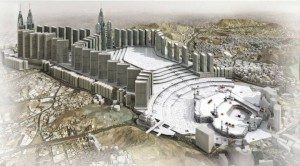Nazry Bahrawi, Research Associate at MEI, gave a radio interview this morning about building projects at Mecca to 94.2 FM, a Singaporean Malay station. Below is the unedited transcript of the interview, translated from Malay by Mr. Nazry.

1. What led to the view that Mecca’s rich history has been sacrificed for development?
Such critiques began surfacing in the past two to three years, with the publications of certain articles in the international media. For instance, the news weekly The Economist juxtaposed Mecca’s emerging landscape to Las Vegas. But this should not be seen as an effort by ‘Western’ nations to oppress Islamic societies. In truth, those who were most critical of these developments in Mecca were Saudis themselves. A fair number were not at all supportive of the modern structures that have been constructed around the Masjid ul-Haram (the Grand Mosque in Mecca) in the past decade. These include skyscrapers, shopping malls and luxury hotels. We also know that the Saudi government will be renovating the Masjid ul-Haram, with the new design speculated to be unveiled in about three years. Still, their critiques are not just directed at the modernisation of Mecca. In fact, they are even more disparaging of the possible destruction of Islamic heritage sites with the revamp of the Masjid ul-Haram. For instance, the house of Prophet Muhammad’s first wife Khadijah has already been turned into a public toilet. As Muslims who profess Wahhabism, those in charge hold the opinion that these sites, which includes the graves of past Islamic figures, could encourage shirk (idolatory). According to a detractor, Dr Irfan al-Alawi, executive director of the Islamic Heritage Research Foundation, his country (Saudi Arabia) has already lost some 400 to 500 sites that could be construed as part of the Islamic civilisation heritage. He is concerned that the move to renovate the Masjid ul-Haram will lead to the further destruction of other sites there, such as the Ottoman-era carved columns that have been there since the 17th century.
2. Is Mecca being exploited for profit by the rich?
In my opinion, Mecca is indeed being exploited such. I came to this conclusion after chairing a forum with Professor Jamal Akbar, an architecture academic and part of the team involved in redesigning the Masjid ul-Haram. According to Professor Jamal, land ownership around the Masjid ul-Haram is not tightly controlled by the government. In fact, it is left up to the market forces. These lands have been bought over by big corporations whose sole aim is to reap profit. Here, we must not forget that the prospect for doing business in Mecca and also Madinah is extremely lucrative. Each year, some 12 million people will head to these cities to perform the obligatory haj, with figures expected to reach 17 million by 2025. Indeed, there are indications that the rapid development in Mecca has not taken into account the rights of Mecca’s inhabitants. One Meccan, in an interview with The Independent, expressed discontentment over the manner his house was demolished with little prior warning.
3. How is the Saudi government reacting to such criticisms?
According to Professor Jamal, the Saudi government is sensitive to the way they respond to such critiques. This is especially pertinent to the revamp of Mecca because they want to avoid creating a discord with other Muslim societies. However, he also feels that Mecca needs to modernise. According to him, a city is as good as its denizens. If it is seen to be undeveloped, then it implies that Muslims as a whole are undeveloped (given Mecca’s status as Islam’s holiest site). Although I agree with this perspective, I fear that the redevelopment of the Masjid ul-Haram, and its surroundings, could possibly abolish what I believe to be the most important aspect of the haj experience – that is, the notion that all humanity is equal in the eyes of God. Given the emergence of luxurious structures, it is likely that the divide between the rich and the poor will show itself up more starkly.
